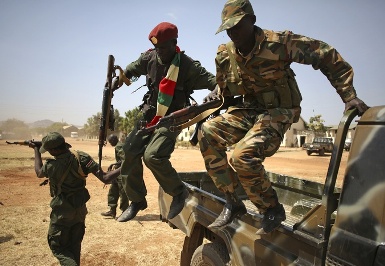South Sudanese forces move out of Juba
February 18, 2016 (JUBA) – South Sudanese government has ordered its forces to move out of the national capital, Juba, in implementation of the security arrangements in the peace agreement signed by warring parties in August 2015 to end 21 months of civil war.

‘‘We were waiting for Dr. Reik Machar [First Vice President] to come to Juba,” said Juuk, speaking to soldiers in Arabic.
“He [Machar] said he will not come unless his guards come first to Juba and we said okay. He said he needed a place for his guards. We showed him his place,” he said.
It was not clear how many troops are supposed to move out from the capital as several thousands are believed to be residents in Juba, some mingling among the civilian residential areas with no uniforms.
President Salva Kiir appointed Machar as first vice president last week in accordance with the peace deal. The leader of the armed opposition leader of the Sudan People’s Liberation Movement (SPLM-IO) however said he will only return to the capital after the security arrangements that move excess government troops out of the capital Juba is implemented. About 3,000 SPLA-IO forces will be transported to Juba to provide protection to Machar.
Defence Minister Manyang said those troops of the opposition will be stationed behind Jebel Korok [Kujur], south-west of Juba, from where Machar rebelled in 2013.
“His officers saw the place. That is where they were before he rebelled,” said Manyang, speaking to the soldiers as they prepared to leave Juba barracks and move 25 kilometres outside the city.
“So we also are moving you (soldiers) as implementation of the peace agreement so that the army will be out of Juba,” he said.
SPLA-IO WELCOMES LOCATIONS
Meanwhile, a senior official from the armed opposition of SPLA-IO said they have assessed two locations, west of Jebel Kurjur (Kerek) in Juba town where to camp their incoming forces.
In a phone call interview, Lt. General James Koang Chuol, told Sudan Tribune that he witnessed the two places this week together with other colleagues from the Joint Monitoring and Evaluation Commission (JMEC) and military officials from South Sudan government.
“Yes, this week we went to the two areas, and our immediate response was both locations are fine [for] our forces,” General Chuol said.
However, Chuol admitted that lack of facilities to accommodate their armed forces is challenging, added that this will not frustrate them as an assembly staying point.
He said the SPLA-IO is committed to the full implementation of the peace agreement in South Sudan, saying it is a big responsibility for the parties to the peace deal.
“We must show to all people that what we have signed in terms of peace in Ethiopian capital, Addis Ababa, should be rightly honoured by all of us,” he said.
Chuol further explained that in addition to the demilitarization of the national capital, Juba, forces in Bentiu and Malakal, plus other town will be relocated outside towns and a joint police force will be deployed.
He however criticized the locations which the government wants to camp its forces outside Juba, saying the locations are closer to Juba than the agreed 25km outside the capital.
DEMILITARIZATION TO TAKE 6 WEEKS
The Joint Monitoring and Evaluation Commission (JMEC) – the body overseeing the peace implementation – said transporting Machar’s troops to Juba and completion of the demilitarization exercise in Juba could take at least one more month.
Speaking to reporters after attending a meeting with members of civil society groups in Juba on Thursday, Bill Harmon, the security and military advisor for JMEC said preparations and sources of funding are delaying the process.
“It will take several weeks to provide resources for the movement; mostly of the opposition forces back to Juba. So the timeline, if we don’t have any more setbacks, then we could see the movement of those forces complete within four to six weeks,” said Harmon.
This, he said, could mean delaying the formation of Transitional Government of National Unity (TGoNU) by the same timeline.
The peace agreement calls for demilitarization of the capital and arrival of the opposition forces before a new government could be formed.
(ST)?
